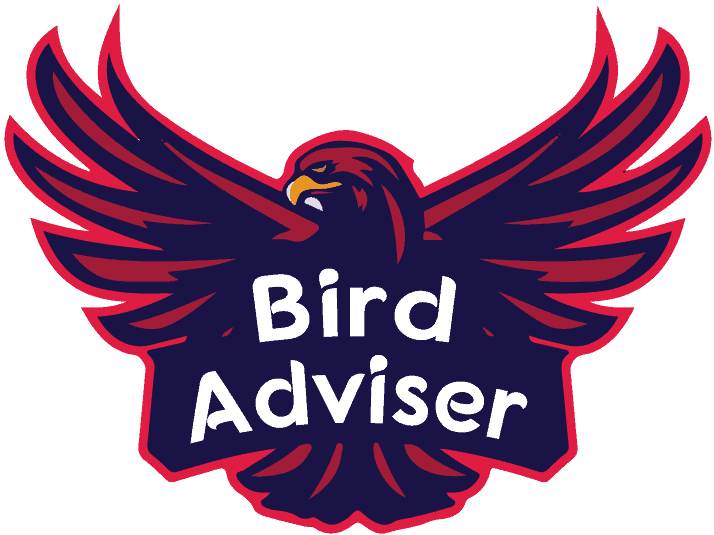As a devoted owner of these charming and intelligent birds, one question that often arises in our minds is, “How long do parakeets live?”
Understanding the lifespan of our feathered companions is crucial for providing them with the best care and creating lasting bonds with these delightful creatures.
In this article, we embark on a journey to explore the factors that influence the longevity of parakeets, also known as budgerigars.
From genetics and diet to environmental considerations, we will uncover the secrets behind their lifespans and gain valuable insights into ensuring a happy and healthy life for our beloved avian friends.
So, let’s spread our wings of curiosity and delve into the fascinating world of parakeet lifespans to discover the secrets that contribute to their joyous and fulfilling existence!
How Long Do Parakeets Live?
The lifespan of parakeets, also known as budgerigars or budgies, can vary depending on various factors.
On average, with proper care and attention, parakeets can live between 5 to 10 years.
However, some budgies have been known to live even longer, reaching up to 15 years or more in some cases.
Now let us look at the Parakeet bird’s lifespan and how much age the Parakeet has in its life.
Parakeet’s Lifespan
In the Australian outback, parakeets usually breed due to rainfall.
This is usually between June and January, but these birds will breed in warm, well-bred cages any time of the year.
In fact, as long as there is plenty of water and food, a budgie can give birth to only a few chicks a year.
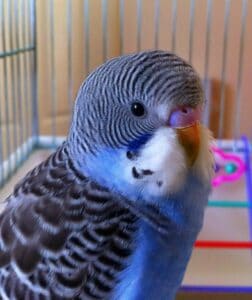
Of course, this doesn’t often happen in the wild, but if birds are allowed to breed, it can cause captivity problems.
Excessive spawning can damage chickens.
Parakeet’s nests are very basic – they only need a simple tree hole.
As long as space can hold an adult and five to eight white round eggs, birds will be happy.
Whole fence rods are often used as a substitute for wood in the wild or even on the ground.
The female bird is solely responsible for incubating the eggs, and when the female brings food, she sits alone on the clutch.
He does this by feeding her seeds, and when the female enters the nest with the chicks, he continues to bring food.
The eggs hatch once a day, and the eggs hatch after 17-19 days.
Chicks are naked by nature.
Their first meal was chicken liquid, sometimes called Parakeet milk.
The sunrise bird stays throughout the day from sunrise to sunset, filling crops with food, returning it to the nest to contemplate its partner, and then passing it on to the chicks.
Males only begin feeding their chicks when they are three weeks old (although overprotective chickens sometimes refuse to stockpile).
How Long Do Pet Parakeets Live?
Pet parakeets, typically have a lifespan of around 5 to 10 years with proper care.
However, with exceptional care and a healthy lifestyle, some pet parakeets have been known to live up to 15 years or even longer.
Parakeets usually live in the wild for five to eight years, but they can easily be kept in captivity for ten to fifteen years.
According to the Guinness Book of Records, the official record for longevity for parakeets is 29 years and two months.
On average, a budgie or parakeet is kept in captivity for about 6 to 12 years.
Of course, this number depends on the type of bird care you carry out.
Life expectancy also depends on the general health, the breed of the bird, the type of diet and exercise received, etc.
In the wild, the average lifespan of a Parakeet is around 15 to 20 years.
Parakeet Lifespan According to Different Species
1. Budgerigar Lifespan
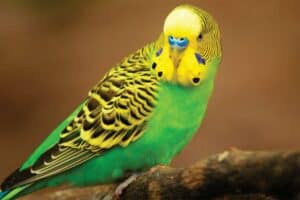
The average lifespan of a budgie is 5-8 years.
It could survive more if it got more care like health, food nutrients, etc.
This Parakeet comes from Brazil, and with proper care, the lifespan of this bird can be extended.
2. Grass Parakeet Lifespan
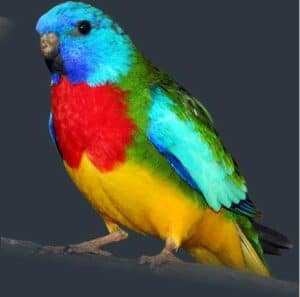
The Grass Parakeet can easily live for ten years.
Where does the Parakeet come from – this Parakeet is native to Australia.
Like other parakeets, life span depends on the medical care received, diet, parental health, or genetic factors.
3. Monk Parakeet Lifespan
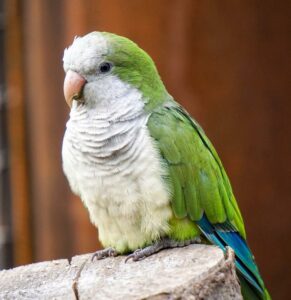
How long a bird can live naturally depends on its general health, reproduction, pedigree, food, exercise, and psychological state.
Monk Parakeet can live up to 20 years, and in the wild, it can survive up to 25 years of age.
3. Barred Parakeet Lifespan
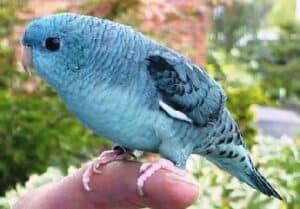
The Barred Parakeet also called the lineolate Parakeet has a lifespan of 10 years.
The lifespan of this Parakeet depends on the feeding it receives, genetics or lineage, genetic diseases (if any), general lifestyle, medical care, diet, and exercise provided by its owner.
4. Mustache Parakeet Lifespan
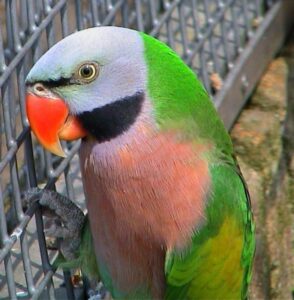
The average life expectancy of a Drinking Parakeet is 20-25 years.
This number is based on the diet, general health, mental and physical health, and exercise that captive birds receive.
How to Tell the Age of Your Parakeet?
Pet parakeet goes through different stages of life.
You can judge a budgie’s age based on the characteristics it typically exhibits in that age group.
The following are some of the age characteristics of indoor or captive birds:
Juvenile Parakeets (1 Month to 6 Months)
At this age, the bird will accept new foods, new toys and is full of energy, but it may be a little bit nervous in front of new people.
This happens when the Parakeet is about six weeks to six months old.
You will also notice that your bird is ready to interact with new birds.
You will find your little Parakeet participating in manga activities alone or with other birds.
Young Adult Parakeets (6 Months to 2.5 Years)
In this time period, your Parakeet will be full of life.
The energy level of the Parakeet is up in this time period.
Adult Parakeets will be from 6 months to two and a half years.
You will see certain changes in your bird during this age span, like playing with new toys and eating different kinds of food.
Middle Age Parakeets (3 Years to 8 Years)
At this age, energy levels drop dramatically.
However, despite the slow speed, the bird will still fly, walk, climb, and perform its usual operations.
You may have set food and game preferences.
She might have a group of birds interacting with her.
Typically, a parakeet at this age forms a key pair.
Old Age Parakeets (8+ Years)
You will find that your Parakeet sleeps longer throughout the day.
It might not shiver like it was before.
Your bird will also eat smaller meals.
Its light intensity will decrease.
Its feathers may not grow as well as before after molting, so it is more susceptible to temperature changes.
Impending Death
The owner can usually tell the pet bird how long it will live because the Parakeet usually knows these 24 hours before its death.
He might play with his favorite toys that haven’t been touched in a while, eat a favorite meal, sing a favorite song, and even get more active on the last day before death.
They can also make partners by living with them and keeping them close.
Factors that are Affecting Parakeet’s Lifespan
1. Environmental Factors
Budgies or Parakeets have a complex respiratory system and are vulnerable to toxic fumes, pollution, household detergents, Teflon-coated cookware, cigarette smoke, poisonous plants, etc.
Parakeets are also easily frightened, and sudden sounds can cause them to fly into the cage and cause shock.
2. Healthy Diet
A healthy diet is essential to keep your Parakeet healthy and harmless.
Since parakeets have fewer fat stores, any deficiency in meals or drinking water can quickly lead to illness or severe dehydration.
3. Proper Cage
The cage should be neat and clean and you have to make sure that the cage is large enough for your birds.
A small and unclean cage could be the reason for your parakeet to not survive.
Because of the small cage, your bird will get severe injuries as the parakeet can’t fly properly in the cage and could injure him.
Check out this amazing cage for your Parakeet on Amazon.
It’s a highly recommended cage to increase the lifespan.
4. Veterinary Care
If your Parakeet is not feeling well and you are worrying whether to take it to the vet or not then the answer is yes.
Broken bones can cause budgies because the bones are brittle and hollow.
Failure to solve this problem may make your pet vulnerable to internal bleeding and infection.
Conclusion
In conclusion, understanding the lifespan of our pet parakeets is essential for providing them with the best care and ensuring a fulfilling companionship.
With an average lifespan of 5 to 10 years and the potential to live even longer with proper care, parakeets offer us the joy of their vibrant personalities and charming antics for a significant portion of our lives.
As responsible pet owners, we hold the key to their well-being and longevity.
By offering a well-balanced and nutritious diet, providing opportunities for exercise and mental stimulation, and maintaining a clean and safe environment, we can positively impact their quality of life.
Regular visits to an avian veterinarian are crucial for monitoring their health and catching any potential issues early on.
Understanding their specific needs and attending to their well-being can foster strong bonds and create cherished memories throughout their time with us.
As we embark on this journey of pet ownership with our parakeets, let us embrace the joy they bring and reciprocate their affection with the love and care they deserve.
By providing a nurturing and enriched environment, we can ensure that our pet parakeets live happily and content lives, sharing in the beauty of this unique avian-human companionship for as long as possible.
FAQ
How long do parakeets typically live as pets?
Parakeets, or budgerigars, have an average lifespan of around 5 to 10 years when kept as pets. However, with proper care, some parakeets can live up to 15 years or even longer.
What factors can influence the lifespan of a pet parakeet?
Several factors can impact a parakeet’s lifespan, including genetics, diet, exercise, environment, and access to regular veterinary care. Providing a healthy and enriched lifestyle can contribute to a longer and happier life for these delightful birds.
Can some parakeets live longer than others?
Yes, the lifespan of parakeets can vary between individuals and bloodlines. Some parakeets may have genetic predispositions that allow them to live longer than others.
How important is a balanced diet for a parakeet's lifespan?
A balanced and nutritious diet is vital for a parakeet’s overall health and longevity. Providing a variety of fresh fruits, vegetables, high-quality pellets, and occasional treats can support their well-being and contribute to a longer life.
Do parakeets need exercise to live longer?
Yes, regular exercise is essential for a parakeet’s physical and mental well-being. Providing opportunities for flight and playtime outside the cage can help keep them active and engaged, contributing to their overall health and lifespan.
Last Updated on July 29, 2023 by Lily Aldrin
